2012 Tri Words of the Year
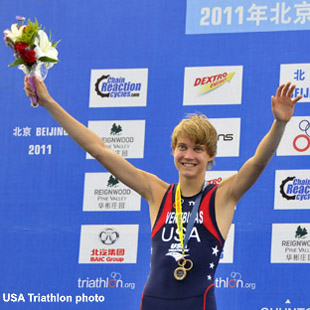
After a search through interviews, articles, blogs and forums within the sport and newspaper and magazines articles in the mainstream press, here are some words that struck a chord in this correspondent’s heart. This time around, concise and witty one-liners were outnumbered by more extended soliloquies that offered insights into the tumult and shouting that occurred in the world of swim, bike and run in 2012.
"The way I got to where I need to be is taking all these risks and not thinking about what could happen, just going at it. If it wasn't for that, I don't think I would have achieved what I have. I could have been more careful. Maybe that is the lesson here.” – Lukas Verzbicas speaking to Chicago Tribune writer Phil Hersh after his devastating injuries suffered in a training bike crash.
“The fact that I’m able to even be here means so much more to me. I’ve never appreciated something like life. I always thought about the small things — the racing and the training and all of that. That was all that mattered to me. Now I see the wide spectrum and the big picture. For me this is the most thankful Thanksgiving I’ve had.” – Lukas Verzbicas speaking to the Chicago Sun Times after finishing third overall of 750 entrants and second in his 15-to-19 age group in the Orland Park Turkey Trot — his first competition since the accident.
”…Remember that every day is special. And every day on your bike is special. Sadly, it seems we've all lost friends on the road. Whenever I see a ghost bike by the side of the road, I can't help but think, ‘That could have been mine.’ Hug someone you love. Be thankful for what you have. And fight hard to keep it.’ — Jordan Rapp writing in Slowtwitch article “Two Years,” a reflection on his near fatal injuries suffered when hit by a car while cycling in Camarillo, California in 2010.
“He was one of the fittest people that I knew. Ex-special forces, counter terrorism and senior law enforcement, trained in surviving in adverse situations including in water. He was also an accomplished athlete, a 2:30 marathoner and was always on the podium. Most importantly, he was a loving husband and a father of three young girls. He was the guy who was always there to help, no matter how big or small the problem was, and was one of the pillars of our community. We started the day together and he was fine. We talked for a long time before the race. When we got on the starting barge together he had a grin from ear to ear. He shook my hand, said, ‘Good luck, see you on the finish line,’ and we jumped in together. I never saw him again.” — David Gething, writing on the Slowtwitch Forum about his friend, Hong Kong policeman Andy Naylor, who died during the 2012 NYC Ironman.
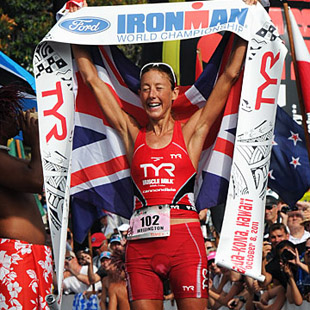
“I have almost recovered from the ill effects (although it looks like the rather large, red scars will stay with me forever!), but it was the nature of the race and the resulting emotions that played a huge part. You know, Kona 2011 truly was the most satisfying and proudest moment of my career. I dug to the very depths of my soul and truly pushed beyond any limit I thought existed. It was the hard-fought race I have always dreamed of, and – as I have said in other interviews – I feel that maybe at this race I proved to myself, and others, that I really was worthy of being called a champion. That was the most pleasing – masochistic – thing of all. The opportunity to push beyond what I thought was possible, not only physically but mentally too.” — Chrissie Wellington in a January 2012 Slowtwitch interview discussing her final Ironman Hawaii victory.
"I didn't think he was that good of a biker," — Joe Bonness speaking to The Naples News regarding longtime rival Kevin Moats' positive test for the banned PED testosterone, which came about when the WTC randomly tested some age group participants.
“I have unusually long femurs combined with a solid slab of muscle over them from years of pushing wheel barrows, treading water, and lifting weights that help my cycling. The other big part is that I am innately efficient at pedaling, unlike running where I look like a large monkey. Over the years I have worked to become more efficient, but no gorilla will ever run like a cheetah.” — Andrew Starykowicz on the pluses and minuses of his highly muscular physique in cycling and running.
“Nobody knew how courageous Nicola’s run was. She was really hurting. Everybody thinks Nicola had a great race – but [during the race] I was thinking, ‘OK. Nicola panicked and went too early.’ I was thinking that when I saw her I was going to give it to her for that move. I thought I’d tell her, ‘You were insane. You were mad.’ She’s been told, ‘No surges. Sit back and do nothing.’ But because of her stomach sickness she threw the game plan out the last 1500 meters. I thought the other girls she was running with would run over top of her.” — Brett Sutton, coach of 2012 Olympic women’s triathlon gold medalist Nicola Spirig.
“Yes, the noise was amazing! It was crazy loud, and at the only point where spectators were not allowed on the run course, my ears were ringing like getting out of a disco with too loud music! But it was fantastic, very motivating!” — 2012 Olympic women’s triathlon gold medalist Nicola Spirig.
“The kind of dedication that would make Chuck Norris cry like a baby! In 2006 when I finished college, I started working in the produce department at a grocery store. For a while I even worked a shift where I would work from midnight to 4:45am, clock out an extended lunch to go swim at morning practice from 5-6:30am, and then go back to work from 6:45-10am. I would sleep during the day until afternoon practice, swim from 4:30-7pm then nap again before heading back to work at midnight.” – Tommy Zaferes explaining what it took to qualify for the 2008 Olympic swim trials.
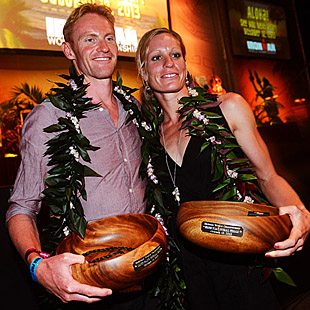
“Maybe that’s why I never train with her. Getting chicked is bad but if it’s you own girlfriend well then that would be a disaster.” — David Dellow, on the wisdom of maintaining separate training regimens with girlfriend Caroline Steffen.
“My father Hermino passed away two years ago from stomach cancer. And for the past two years my mom Marta has been battling melanoma cancer which has invaded her lymph system. Tomorrow is Mother's Day. So this is the best gift I can give her — that I fight for my dream and I do not give up on my dream.” — Manuel Huerta whose family left Cuba and brought him to America, on what it meant to qualify for the U.S. men’s 2012 Olympic triathlon team.
“Great good, and great frailty, can and often does exist inside the same man. Lance Armstrong came as close as any single man has to wrecking an entire, magnificent, sport. He broke our hearts. That's the half. He also did more than any single man to build an entire, magnificent sport. He impressed upon us — he overwhelmed us with – his work ethic, his courage, his force and, at times, kindness. That's the other half. If I fail to recognize the enormity of his bad acts, I'm fooling myself. But if I side with the mob and recognize only his bad acts, I'm taking the easy route. Until I can incorporate and process all of it, I haven't wrestled with this enough.” — Dan Empfield writing in Slowtwitch article “The Entire Lance Armstrong.”
“The biggest challenge with the tether is on the swim. If the guide moves even inches away, your stroke is cut off significantly. If they move toward you, the tether goes slack and you get no signal whatsoever. The aim is to maintain a constant tension because that is the only way of communicating. They have to pull me with the tether or push or punch me. Sounds bad, but when there are 2,000 other people in the water, it can’t be gentle. I’ve come out with bruises on my arms from being punched, but it’s fine because communication is crucial.” — Patricia Walsh, 2012 USAT Paratriathlon national champion in the TRI 6 category for legally blind competitors.
“Mate, you wouldn’t believe. There’s a lot of fun to be had, that’s certain. I’ve been semi-abducted in Morocco resulting in a day of ‘accidental’ tourism, chain smoked 1,000 cigarettes when watching World Cup soccer amongst 100,000 Germans, watched road fatalities in China, eaten ‘delicacies’ in South Korea, gotten drunk at karaoke with old, gay Japanese men, paid for taxi fares from the driver’s own coin purse (sometimes things get tight)…. Oh yeah, & plenty of gastro.” — Australian Josh Amberger discussing life as a poor young triathlete on the international circuit.
"It was very, very hard to convince her. I attempted once, I tried twice, I tried a third time and finally she agreed to date me. Maybe that is the reason I always try and never give up!" — ArgentineOscar Galindez on what he learned courting his beautiful wife Lisa.
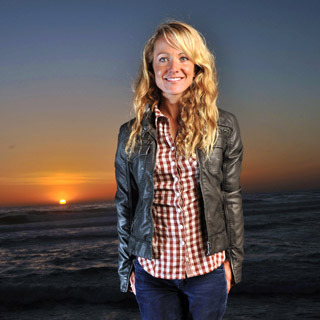
“I began playing for the boys’ team of the Stirling County Rugby Club when I was 7. I was the only girl among 250 boys. The boys either wanted to tackle me extra hard or were too scared to come near. I loved to get dirty and I loved to fight the boys. I learned pretty quickly how to take care of myself. When you are 7 or 8, boys and girls are about the same size. It’s full contact when you are that age and technique and speed make the difference. Often you would walk out on the pitch and opponents would go, 'Ahhh it’s a girl!!' Then the game starts, you knock the shit out of them, and they shut up.” — Two-time XTERRA World Champion Lesley Paterson of Scotland discussing her early days in sport.
“To think about the moment I hit the finish tape still has me in tears. No words can explain it. Maybe it felt like a girl on her wedding day when she lands the man of her dreams and finally gets to kiss him. Maybe not that exciting, but it was unreal. I didn’t want to let go of the tape or give it back. I wanted to stand there and high-five and kiss every person at the finish line, to thank each of them for being there and making it my loudest, most exciting moment in sport since 2007 when I ran across the line at Ironman Kona with [her then infant son] Kainoa. All the tears over the last two seasons finally faded.” — Kailua-Kona professional triathlete and single mom Bree Wee after her breakthrough win at 2012 Ironman Louisville.
Premonition
“In the last miles of the race, when the voice is at the door knocking in my head, you tell yourself, ‘Don’t go there.’ The truth is, we all go there – but the best in the sport find some way to ignore those negative thoughts and to not put them into play. You can’t help it, they will inevitably visit you because your brain is designed to keep you alive – the fight or flight response is built into all of us. But how well you go depends on how you respond. When you are dialed in you can say to the voice that tempts you to quit to just stop it.” — Leanda Cave in 2012 Kona pre-race interview.
Realization
“My head switched off and all I can remember seeing is Caroline getting closer and closer and at 23 miles, I made the pass. I surged right at the bottom of the last hill and it wasn’t pleasant. Everyone has a pain threshold, and had just hit mine… My heart rate felt low (I don’t wear a watch or use a bike computer for that matter during a race), but I could not push any harder. I gave the last few miles everything. This was a fight for a World Championship title that I have been chasing for years and I was not going to lose.” — Leanda Cave writing in her blog on what she felt during her winning pass at Ironman Hawaii.
Empathy
“A little bit of guilt came across as I know the disappointment Caroline must have felt as she found herself now in 2nd place, which is still such a great result. I also felt bad that I couldn’t celebrate with the crowds in the last quarter mile because I was scared I would be caught.” — Leanda Cave 2012 Ironman World Champion, blog entry.
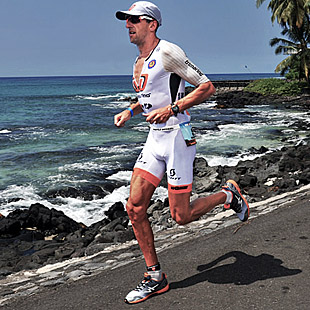
Diary of a Meltdown
“…After 15 kilometers on the run, Jacobs had only cut my lead from 8:20 to 7 minutes. I was running around 2:50 [pace] and I thought he was catching me too slow to close the gap. Problem was at that point a beverage station was not ready. They were still pouring their drinks and nearly all the kids were taking a picture with their phones to show that they are the first ones giving a sponge. If [the sponge] was dry, well too bad for me. Also was it nice if you get an empty cup?
“OK, probably in the 10 Ironman races I did win, they are often not ready when they see the first athlete coming. But if you later get what you need, it can still be put right. But this was different. At this level, when your effort is on fire, for every second you pay all cash and so I did. At mile 12, the accumulation of all previous small things I missed, my body temperature became too high.
“Right then my head felt like it was ready to explode. I had abdominal cramps and my diaphragm was shutting down. I later heard in the ambulance that I had lactic acidosis or something (I must look it up), which is a feeling that the current [power] everywhere fails. My legs, arms, head were tingling and it felt as if the automatic handbrake was turned on. I tried everything and stumbled through Mile 15 but at mile 17 there was no moving anymore. Bink [Vanhoenacker’s own nickname] just sat down. I got in the ambulance and after 45 minutes of the oxygen pump, my diaphragm came loose again and I get a little feeling in arms, legs and head.” – A translation of Marino Vanhoenacker writing in Dutch on his blog about his meltdown after carrying a big lead halfway through the run at Ironman Hawaii.
"I was gutted. I was lost for words. I felt sick to my stomach. I couldn't breathe…. Rio is starting to creep into my head. I still love this sport. Just parts of it hurt." — Emma Snowsill speaking to Daily Telegraph writer Amanda Lulham on her disappointment on failing to make the 2012 Australian women’s Olympic triathlon team – and on her reawakened 2016 Olympic ambition.
“Triathlon is what I love doing. If you are at Oxford, people ask you, ‘What do you want to do when you are done with your MBA?’ I say, “I want to run around in Lycra.” — Mari Rabie, Rhodes Scholar, 2008 Olympic triathlete, 2012 XTERRA world championship bronze medalist.
“Of course I forgive him. If I ever to run into him somewhere I would not refuse to talk to him. If he wants to talk about that, I don’t have any problem. We are persons, we are humans, we can talk. That is fine.” — Javier Gomez on his thoughts about British triathlete Harry Wiltshire, who was banned by the ITU for six months after essentially mugging Gomez during the swim at the 2011 European Championships.


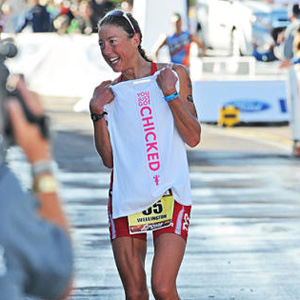
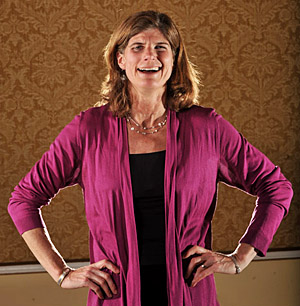
Start the discussion at slowtwitch.northend.network